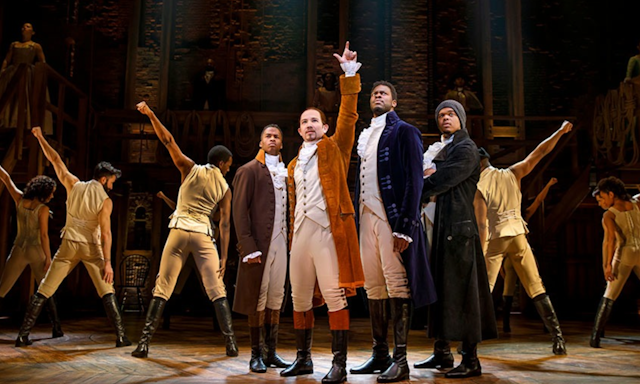Hamilton, the musical, is coming to Canada.
Four years after taking Broadway by storm, Lin-Manuel Miranda’s portrayal of the life and times of Alexander Hamilton, one of the most colourful founding fathers, opens this month to sold out shows in Toronto.
Hamilton’s main draws are its fabulous music and astonishing plot. Born a nobody on the British-ruled island of Nevis, Hamilton became a romantic polymath who fought wars and duels, wrote treatises and doctrines and helped turn 13 rebellious colonies into a rising empire. Inspired by Ron Chernow’s 2004 biography, Miranda’s masterpiece features a hip-hop soundtrack, a multiracial cast and powerful arguments, in theatrical form, for a more inclusive America.
More subtly, the play also explores ambition, a traditionally maligned passion in British North America that became a distinctive national ethic in the early United States.
Ascent from poverty
From the first scene to the last, Hamilton relates an incredible case of social mobility: “How does a bastard, orphan, son of a whore and a Scotsman … grow up to be a hero and a scholar [and a] Founding Father?” The curtain parts as a teenaged Hamilton leaves his Caribbean birthplace and lands in New York City in 1772, determined to rise up in this “new land,” where “you can be a new man.” His destiny and that of the 13 colonies merge.
“Hey yo, I’m just like my country,” he boasts, “I’m young, scrappy and hungry!” Both the man and the nation must throw off British rule to realize their mighty potential.
In the play — and in history — the young Hamilton’s skills with the sword and pen catch the eye of George Washington, the statuesque leader of the Continental Army. As Washington’s right-hand man, Hamilton helps keep the American Revolution alive after the British chase the outgunned rebels out of New York in late 1776.
Hamilton brilliantly captures the boundless energy of its main character. We watch Hamilton woo the daughter of a wealthy landlord, lobby the Continental Congress for more money, and outshine the other officers around Washington. “The Man is NON-STOP!”
With independence won, Washington entrusts his favourite officer with the new Treasury Department — and sides with Hamilton against Thomas Jefferson and most Americans, who don’t understand that with the revolution over and done with, the new country must act a bit more like the self-interested, hyper-capitalist empire it just defeated. In the play’s version of the chaotic 1790s, only Hamilton is smart enough to create a national bank and financial system while keeping the U.S. out of the French Revolution.

Miranda’s opus inevitably adopts many of the arguments of its title character. At times it turns Hamilton, a deeply elitist man who wanted to insulate economic and foreign policy from ordinary people, into a progressive visionary.
Nonetheless, the play is accurate in its read of Hamilton’s motivations. On stage as in real life, the man from Nevis doesn’t seek money or office. He doesn’t need creature comforts or cheap thrills. What he wants, more than anything is for the world to know his name. He’s defined and perhaps consumed by ambition, the desperate desire to be noticed by strangers and posterity.
Dangerous passion

The American patriots believed that republics required selfless and civic-minded citizens who were always on guard against those who lusted for power. The people had to “know ambition under every disguise it may assume,” Jefferson warned in 1781. Otherwise, their republic would fall into corruption and tyranny.
In a society built on family labour, ambition often seemed useless as well as dangerous. Farm parents needed dutiful children, not ambitious dreamers.
Indeed, colonial Americans denounced ambition as a “fire” that threatened to destroy social ties and moral duties. They knew it as a radically selfish passion, a dark blend of pride, envy and rage.
By abolishing monarchy and aristocracy, however, revolutionary leaders also invited go-getters to reach for the sky. They celebrated their revolution as a grand theatre on which previously obscure people could do remarkable things.
In other words, they deliberately stoked ambition even as they worried about its destructive energies.
Ultimately, Americans like Hamilton solved this cultural riddle by turning ambition into a national virtue — something that was good and moral so long as it was in service to the United States, the only country (in theory) where merit found its reward. For young men, at least, the burning desire to rise up became not only a right but also a duty, something that would carry the nation as well as themselves to greatness.
American dreams
In this sense, Hamilton reflects the cultural moment in which the play is set. It is a celebration of a new and lasting marriage between individual and national ambition in American culture. It is a paean to patriotic ambition, set against the amoral careerism of the anti-hero, Aaron Burr, whom Hamilton ultimately confronts on the duelling ground.
“Alexander Hamilton!” the chorus exults in the opening number. “When America sings for you, will they know what you overcame?” Hamilton replies on his deathbed: “America, you great unfinished symphony, you sent for me.”
And yet Miranda’s play is also honest about ambition’s costs. Hamilton’s relentless pursuit of fame draws him away from his dutiful wife, Eliza, who can only wonder why she and the children aren’t enough. His inability to respect other people’s views — he assumes they can’t keep up with him — alienates him from his peers. He’s too busy to love anyone but himself, his country and their shared destiny.
In all these ways, Hamilton captures the national tendency to see history as a grand drama, in which the exceptionally driven and talented make things happen, for better and worse.
By its very nature, of course, this way of looking at ambition and history marginalizes the everyday concerns of most people, whose duties inevitably outweigh their dreams. That’s yet another irony for a country that has long seen itself as the only real democracy.

